
John Joseph O'Connor was an American prelate of the Catholic Church. He served as Archbishop of New York from 1984 until his death in 2000, and was made a cardinal in 1985. He previously served as a U.S. Navy chaplain, auxiliary bishop of the Military Vicariate of the United States (1979–1983), and Bishop of Scranton in Pennsylvania (1983–1984).

AIDS Coalition to Unleash Power is an international, grassroots political group working to end the AIDS pandemic. The group works to improve the lives of people with AIDS through direct action, medical research, treatment and advocacy, and working to change legislation and public policies.
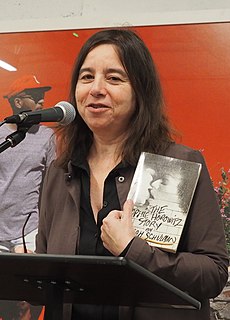
Sarah Miriam Schulman is an American novelist, playwright, nonfiction writer, screenwriter, gay activist, and AIDS historian. She is a Distinguished Professor of the Humanities at College of Staten Island (CSI) and a Fellow at the New York Institute for the Humanities. She is a recipient of the Bill Whitehead Award.
Maria Maggenti is an American film director and screenwriter for film and television, who has traditionally created independent films. She was the script editor for the American television series, Without a Trace (2003) and has written many episodes for the show as well, but is perhaps best known for her feature film, The Incredibly True Adventure of Two Girls in Love (1995). Her film Puccini for Beginners was in competition at the Sundance Film Festival in January 2006. She was also an activist with ACT UP for many years.

Common Threads: Stories from the Quilt is a 1989 American documentary film that tells the story of the NAMES Project AIDS Memorial Quilt. Narrated by Dustin Hoffman with a musical score written and performed by Bobby McFerrin, the film focuses on several people who are represented by panels in the Quilt, combining personal reminiscences with archive footage of the subjects, along with footage of various politicians, health professionals and other people with AIDS. Each section of the film is punctuated with statistics detailing the number of Americans diagnosed with and dead of AIDS through the early years of the epidemic. The film ends with the first display of the complete Quilt at the National Mall in Washington, D.C. during the 1987 Second National March on Washington for Lesbian and Gay Rights.

The Prescription Drug User Fee Act (PDUFA) was a law passed by the United States Congress in 1992 which allowed the Food and Drug Administration (FDA) to collect fees from drug manufacturers to fund the new drug approval process. The Act provided that the FDA was entitled to collect a substantial application fee from drug manufacturers at the time a New Drug Application (NDA) or Biologics License Application (BLA) was submitted, with those funds designated for use only in Center for Drug Evaluation and Research (CDER) or Center for Biologics Evaluation and Research (CBER) drug approval activities. In order to continue collecting such fees, the FDA is required to meet certain performance benchmarks, primarily related to the speed of certain activities within the NDA review process.
Ann Northrop is a journalist and activist, and the current co-host of TV news program Gay USA.

Stop the Church was a demonstration organized by members of AIDS Coalition to Unleash Power on December 10, 1989, that disrupted a Mass being said by Cardinal John O'Connor at St. Patrick's Cathedral in New York City. One-hundred and eleven protesters were arrested, 53 of whom were arrested inside the church. The main objective of the demonstration was to protest O'Connor's opposition to the teaching of safe sex in the public school system, and his opposition to the distribution of condoms to curb the spread of AIDS. During planning, the protest was joined by Women's Health Action and Mobilization (WHAM!), who opposed the Catholic position on abortion rights.
Robert Hilferty was an American journalist, filmmaker, and AIDS activist based in New York City.
Mark Harrington is an HIV/AIDS researcher, a staunch activist for HIV/AIDS and tuberculosis awareness, and the co-founder and policy director of the Treatment Action Group (TAG). After graduating from Harvard University in 1983, Harrington spent time exploring and did not commit to one specific career. When the AIDS epidemic became personal for Harrington, and close friends were being infected with HIV, he decided to take action and joined the group, AIDS Coalition to Unleash Power or ACT UP. As part of the Treatment and Data Committee of ACT UP, Harrington fostered relationships with government officials associated with AIDS research. Eventually differences in opinions on how to best advocate for HIV/AIDS research led to Harrington and other members of ACT UP leaving to start their own group, TAG. With TAG, Harrington was able to create influential and meaningful policy regarding HIV/AIDS research and he worked closely with the NIH, WHO, and other government organizations. Over the years Harrington has distinguished himself as an adept scientist and reputable researcher in his own right. Currently he is published in multiple scientific journals and continues to be an advocate for those with HIV and TB around the world.

David France is an American investigative reporter, non-fiction author, and filmmaker. He is a former Newsweek senior editor, and has published in New York magazine, The New Yorker, The New York Times Magazine, GQ, and others. France, who is gay, is best known for his investigative journalism on LGBTQ topics.
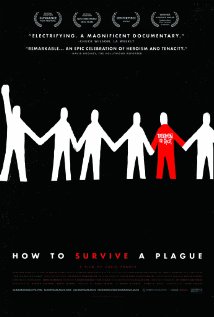
How to Survive a Plague is a 2012 American documentary film about the early years of the AIDS epidemic, and the efforts of activist groups ACT UP and TAG. It was directed by David France, a journalist who covered AIDS from its beginnings. France's first film, it was dedicated to his partner Doug Gould who died of AIDS-related pneumonia in 1992. The documentary was produced using more than 700 hours of archived footage which included news coverage, interviews as well as film of demonstrations, meetings and conferences taken by ACT UP members themselves. France says they knew what they were doing was historic, and that many of them would die. The film, which opened in select theatres across the United States on September 21, 2012, also includes footage of a demonstration during mass at St. Patrick's Cathedral in 1989.

Peter Staley is an American political activist, known primarily for his work in HIV/AIDS activism. As an early and influential member of ACT UP, New York, he founded both the Treatment Action Group (TAG) and the educational website AIDSmeds.com. Staley is a primary figure in the Oscar-nominated documentary How to Survive a Plague.
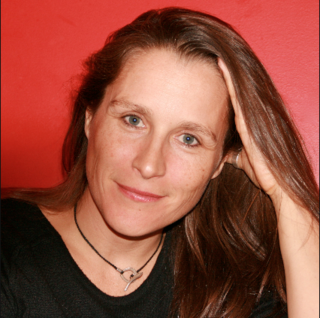
Catherine Gund is an Australian-born American producer, director, writer, and activist who founded Aubin Pictures in 1996. Gund's films have screened around the world in festivals, theaters, museums, and schools; on PBS, the Discovery Channel, Sundance Channel, Netflix, and Amazon Prime.
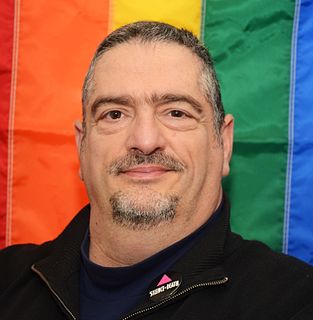
Michael Anthony Petrelis is an American AIDS activist, LGBTQ rights activist, and blogger. He was diagnosed with Acquired Immunodeficiency Syndrome (AIDS) in 1985 in New York City, New York. As a member of the Lavender Hill Mob, a forerunner to the AIDS Coalition to Unleash Power, he was among the first AIDS activists to protest responses to the disease. He was a co-founding member of ACT UP in New York City, New York, and later helped organize ACT UP chapters in Portland, Oregon, Washington, D.C., and New Hampshire, as well as the ACT UP Presidential Project. Petrelis was also a founding member of Queer Nation/National Capital, the Washington D.C. chapter of the militant LGBTQ rights organization.
New York City was affected by the AIDS epidemic of the 1980s more than any other U.S. city. The AIDS epidemic has been and continues to be highly localized due to a number of complex socio-cultural factors that affect the interaction of the populous communities that inhabit New York.
Jean Carlomusto is a New York filmmaker, AIDS activist, and interactive media artist. She produced and directed HBO's Emmy nominated documentary, Larry Kramer in Love & Anger, which was featured at the Sundance Film Festival. Her works have been exhibited internationally in festivals, museums and on television. She was an early pioneer in documenting the AIDS crisis. As the founder of the Multimedia Unit at Gay Men's Health Crisis, she created the television series Living with AIDS. She was a founding member of DIVA TV and a member of the Testing The Limits Video Collective.
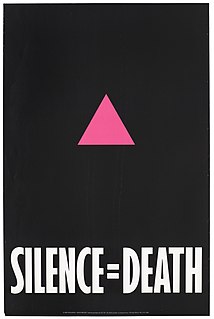
The Silence=Death Project, best known for its iconic political poster, was the work of a six-person collective in New York City: Avram Finkelstein, Brian Howard, Oliver Johnston, Charles Kreloff, Chris Lione, and Jorge Soccarás.

Raymond Robert Navarro was an American video artist, filmmaker, and HIV/AIDS activist. Navarro was an active member of ACT UP and a founder of Diva TV. His activism was featured in the documentary How to Survive a Plague. Navarro's art was exhibited at the Institute of Contemporary Art, Boston, and in Pacific Standard Time: LA/LA.

Social and political activism to raise awareness about HIV/AIDS, as well as to raise funds for effective treatment and care of people with AIDS (PWAs), has taken place in multiple nations across the world since the 1980s. As a disease that began in marginalized populations, efforts to mobilize funding, treatment, and fight discrimination have largely been dependent on the work of grassroots organizers directly confronting public health organizations as well as politicians, drug companies, and other institutions.














